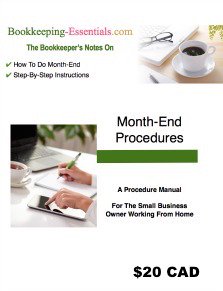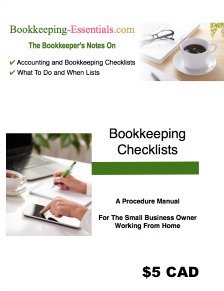Unclaimed Capital Cost Allowance
by Too Shy To Say
(Canada)
I've noticed that for income tax returns, not all of the CCA needs to be claimed. However, to dispose of assets during the year, CCA needs to be calculated in order to properly record a gain or loss on the disposal of the asset.
Why is only part of the CCA claimed for income tax purposes, and what is the adjusting entry that reconciles the difference between calculated CCA in the books, and claimed CCA on the income tax return?
Thank you for your help!

What excellent questions! I am going to jabber a bit to give you some background information ... and then I will specifically answer your questions at the end. If you follow the links in my reply, it will/should give you more details on the subject. So let's start ...
It's important not to confuse tax accounting and GAAP/ASPE (book) accounting.
In book accounting, allocating the use of an asset over time (depreciation) requires estimating its useful life. You won't know how good your estimate is until you dispose of the asset.
Common methods of calculating depreciation are straight line, double declining balance and sum-of-the-years. The straight line method is original cost (OC) - salvage value / useful life = amount to be expensed each year.
The purpose of depreciation in accounting is to match costs with revenue ... which is why there are different methods to choose from. This means that before you record the sale of an asset, you will take the appropriate amount of depreciation expense for the period ... prorating the amount if it is for less than a year.
When a business sells an asset, you remove the net book value (OC-AD=NBV) from the books and book the gain or loss on the sale. The bookkeeping entry for the sale of an asset can be found in the article Common Bookkeeping Entries.
Two Different Countries
So here's the thing that confused me for a long time. It had to be explained to me again and again ... because I had trouble grasping the concept. Tax is a country separate from the country of book accounting. It's like there are two sets of books ... one for book accounting and one for tax accounting.
Update April 29, 2010 - I was researching something else when I came across some information on income tax minimization in Thomas Beechy's book Canadian Advanced Financial Accounting. As what I said above is incorrect, I will quote how Mr. Beechy explains it:
There is no such thing as "keeping two sets of books," one for financial reporting and one for income tax. A company's financial statements must be reconciled to the computation of taxable income on the tax return, and any differences in accounting will be quite obvious to the government. It is true that some items are treated differently for accounting and for income tax purposes; the obvious example is depreciation versus capital cost allowance. Different schedules must be maintained by the company in order to keep track of the two different measures of capital consumption. But keeping track of a few required differences in treatment does not mean keeping a separate set of books. For the vast majority of items for which the tax act does not require special treatment, the tax treatment is expected to correspond with the accounting treatment. There is only one set of books.
Sorry for explaining it improperly! :0(
There will always be differences between these two "countries" ... think Canada versus United States ... or Quebec versus France ... or Ontario versus Alberta (I know ... they are provinces not countries but you get the idea) ... or book accounting versus tax accounting.
Some of the differences between the two "countries" are temporary ... often referred to as timing differences.
Basically it means over time, they will be equal ... think of it like each "country" has different laws (rules). For example, the expensing of the wear and tear is done at different rates in different countries ... so Tax "country" has capital cost allowance (CCA) laws (rules) and Book "country" has depreciation laws (rules).
Other differences between these two "countries" are permanent. Time will not be an equalizer. The numbers will always be different. This is because some legitimate (and not so legitimate) business expenses are not tax deductible.
The only similarity between the two "countries" with regards the allocation of wear and tear of the asset is that depreciation is limited to the original cost of the asset.
Okay ... now that the background has been laid ... let's see if I can answer your questions.
Why is only part of the CCA claimed for income tax purposes?
Evelyn Jacks defines CCA as a tax deduction based on a declining balance method of accounting for depreciation of an asset on the tax return. The deduction acknowledges wear and tear on business assets used to produce income.(1)
Remember in accounting "country", the purpose of depreciation is to match costs with revenue. However, in tax "country", the purpose of CCA is to respond to the economic and fiscal policies of the federal government.
This allows the government to stimulate certain sectors ... which sometimes means allowing certain sectors to reduce their taxes in the current period by allowing a larger expense to be deducted. So the declining balance rates set are not always tied to the life of the asset ... and often lean to government priorities.
Now what comes next is important ... so perk up!
CCA is an optional deduction. Stephen Thompson explains that you don't have to make a full CCA claim on your tax return every year. If you are losing money, save the tax deduction for another year ... which means it is better to NOT take the CCA deduction in years where you have a loss.(2)
Mr. Thompson also explains that you can choose to take a partial deduction to bring your net business income to zero.(2)
This explains why you sometimes only see part of the CCA claimed for income tax purposes.
What is the adjusting entry that reconciles the difference between calculated CCA in the books and CCA claimed on the income tax return?
In tax "country" CCA is not always tied to useful life. The laws (rules) for CCA say proceeds from sale of assets are deducted before the CCA for the year is calculated (acquisitions are added on) ... look at a CCA schedule on your tax return to verify this ... but the asset has been removed.
So too in accounting "country". Once you record your sale in book accounting, you have disposed of the asset and removed it from the books.
The timing difference between the two "countries" is now gone ... there is no adjusting entry.
Dispositions of Assets For Tax Purposes
Two things here you need to be aware of.(1)
Remember I said depreciation and CCA could not exceed original cost. This means that on the sale of an asset for tax purposes, any proceeds that exceed the original cost creates a gain that is reported on a separate tax schedule. So that is point number one.
The second point is a bit more complicated and it involves recapture and terminal loss rules (3). If you sell all of the assets in a particular CCA class or pool, the group must be reconciled at this point. The last proceeds of disposition will put the class into a positive or negative balance.
If you have a CCA balance left after you have sold off the last asset in the class, you get to take a terminal loss ... which means you get to take the full amount as a deduction in the current tax year. :0)
If you don't have a CCA balance left after you have sold the last asset in the class (it's negative) ... it means you claimed too much CCA in prior years ... and you have to add it back to your income in the current tax year. :0(
This is where having a great tax accountant can help. They can help you plan the purchase and sale of your assets for the best tax benefit to you. As far as I know, most bookkeepers do not provide this kind of tax planning ... and shouldn't in my mind. Tax accountants have been trained to help you out here.
Do You Need GAAP/ASPE Financial Statements?
Having said that, many small business owners are active in their business and have little to no debt ... which means they have minimal third party reporting requirements.
Some small business owners choose to deviate from GAAP/ASPE and use tax accounting (capital cost allowance) as their amortization method in their accounting books eliminating depreciation timing differences.
If you have a banker or insurance agent interested in your financial statements, make sure they are okay with this ... and make sure you disclose your accounting policy in your notes.
Footnotes to resources used in responding to this question:
Two great resource books that have user friendly language about CCA are (1) Evelyn Jacks Make Sure It's Deductible - Little Known Tax Tips For Your Canadian Small Business and (2) Stephen Thompson's 167 Tax Tips for Canadian Small Business.
(3) Class 10.1 vehicles have different rules.
Comments for Unclaimed Capital Cost Allowance
|
||
|
||
|
||
|
||
Enjoy A Tea Break With
Me Today. Let's Chat!
Use the search feature to quickly find the
information you're looking for.
Join Me On Facebook
Help support this site by "liking" me! Here's where I post current information.
Listed Under Websites NOT Local Business.
This website is NOT associated with the business operating in Bonnyville AB.



